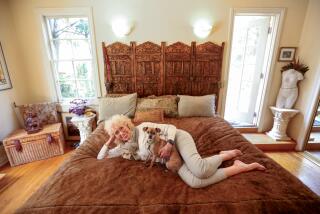Sleep, baby. But ... where?
- Share via
New mother Melissa Gluck knows that it’s risky to sleep in the same bed with newborns.
But after seven sleepless weeks of rousing herself from bed every few hours to nurse her crying baby, she relented. “I was falling asleep nursing,” says Gluck, 32, of La Canada Flintridge. So she put Owen in bed with her. He slept longer between feedings, and she got more rest.
Then, several weeks ago, Gluck heard about a newborn’s apparent suffocation in Torrance after sleeping with his teenage parents on the same bed -- in a hospital, no less. That night, Owen was back in the bassinet.
In a matter of hours, though, he was again snuggled up near his mom, who says she was unable to sleep without his breath on her cheek.
“It’s hard to decide what to do,” Gluck said.
As in so many matters of child-rearing, the decision to bed share is a highly personal, often controversial, topic. It’s also increasingly common.
The American Academy of Pediatrics and researchers who study infant deaths say bed sharing leaves babies vulnerable to being crushed or suffocated and may increase their risk for sudden infant death syndrome, especially if the mother is a smoker.
The safest place for infants to sleep is in the same room as the mother but in their own crib, bassinet or cradle, the organization says. A policy statement to that effect was published in the November 2005 issue of the journal Pediatrics.
In advising against bed sharing, the policy statement pointed to numerous studies supporting its case, including one showing that nearly half of 119 infants who died suddenly and unexpectedly during a four-year period in the St. Louis area did so while sleeping with someone else.
In the Torrance death, tiny Carlos Franco was found dead between his parents only hours after a midnight feeding. His father had apparently placed the child on a pillow on his chest and fallen asleep, with the child’s mother beside him. He lived less than a day.
“The epidemiological studies suggest bed sharing is unsafe,” said Dr. Thomas Keens, a pediatrics professor at Childrens Hospital Los Angeles and at USC. “The risk, statistically, is higher for SIDS if you bed share than if you don’t,” although the causes of the syndrome are unknown.
But some parents, as well as some doctors and advocates of breast-feeding, insist that sharing a bed encourages breast-feeding, calms babies, promotes bonding and allows new mothers and fathers a little more coveted shut-eye.
“Think of any other mammal in the night; they all sleep with their young and nurse,” said Katy Lebbing, who manages the breast-feeding information center at La Leche League International, the world’s largest support group for breast-feeding mothers. “Our lives are just easier when we follow the management techniques of other mammals.”
Whatever public health officials may say, the practice of bed sharing has been growing in the United States. A survey of nearly 8,500 people found that 12.8% of infants regularly shared an adult bed at night in 2000, more than double the percentage in 1993, according to a government study published in the Archives of Pediatrics and Adolescent Medicine. Nearly 45% of those polled over the eight years shared their beds with infants occasionally.
For some mothers, particularly those who are breast-feeding, bed sharing is just easier and more comfortable. Once the infant latches on, both mother and baby can even sleep through the feeding.
“If the baby starts crying, you’re right there,” said Jennie-Marie Mahalick, 28, who was attending a Mommy and Me yoga class in Hollywood recently with her infant daughter, Marli. “I can just roll over to feed her.”
“It makes for a more restful night for all of us,” added Marguerita Mees, 32, of North Hollywood, a yoga classmate of Mahalick’s. She shares her bed not only with her husband and 8-month-old daughter, Fiona, but also with her 3-year-old daughter, Forrest. “It just feels right.”
Doctors themselves sometimes disagree about what’s best. In a measure of how contentious this issue can be, a panel of experts on breast-feeding for the American Academy of Pediatrics sharply disputed the organization’s recommendation against sleeping with infants.
“Bed sharing under safe conditions may prove to be an important factor in the success of breast-feeding,” the panel wrote in a letter to Pediatrics, noting that breast-feeding itself has been associated with reduced infant mortality.
The warning, panel members wrote, “may increase maternal anxiety about this practice and reduce breast-feeding duration.”
Other studies have suggested that bed sharing results in more maternal touching and attention, and some parents believe this perhaps leads to greater self-esteem and self-discipline in adulthood.
Anthropologists note that bed sharing is common in many other cultures -- for instance, in many Asian and Latin American countries.
James McKenna, an anthropologist at the University of Notre Dame in Indiana, suggested in a recent research article that “mother-infant co-sleeping represents the most biologically appropriate sleeping arrangement for humans and is both ancient and ubiquitous simply because breast-feeding is not possible, nor as easily managed, without it.”
Thomas Weisner, a UCLA professor of anthropology and psychiatry, said placing infants in cribs in rooms separate from the parents’ bedroom became more popular in the United States in the 20th century.
“The idea that a child would be too, quote, ‘dependent’ on the parent, as opposed to being independent and autonomous, is a cultural idea that has grown in the 20th century as a moral value,” Weisner said, adding that parents’ bedrooms have come to be seen in a sexual context. “We’re a culture that highly values the married couple relationship.”
In the United States, although routine bed sharing appears to be relatively rare among middle-class whites, it is fairly common among black, Latino, Asian and white families in the Appalachian Mountains, according to a report Weisner co-wrote in 2002.
Dr. Michael Malloy, a professor of pediatrics at the University of Texas who helped write the pediatric academy’s policy, acknowledged the concerns of bed-sharing advocates.
“We’re not trying to be negators of maternal-infant bonding and have no desire to do that,” Malloy said. “Our desire is to make the public aware of the potential risk. And if the parents are willing to take those risks, they’re willing to do so knowledgeably.”
Infant-mortality experts have cautioned against drawing conclusions from the bed-sharing practices of other cultures, because, for example, some sleep on firm mats on the floor, not the soft bedding -- a suffocation hazard -- commonly found in the United States.
The clash between infant-mortality and breast-feeding experts is unfortunate, said Penny Stastny, a nurse and SIDS expert for Los Angeles County public health department.
“We really want to come to a point where the breast-feeding advocates and the SIDS community see eye to eye,” she said. “I don’t think they have a total understanding of the possible danger.”
Stastny said that between January and July, 17 of the 41 presumptive SIDS cases reported in Los Angeles County involved infants who were found sleeping with someone else.
Dr. William Sears, an Orange County pediatrician known for his advocacy of sleeping with infants, acknowledges the appeal of a bed-sharing statement, one that would protect the children of parents who don’t do it safely.
“But I think a wiser approach and a more professional approach is to say, ‘If you co-sleep, do it safely, and these are the things to do,’ ” he said.
For instance, he has said, sharing a bed is not recommended if a parent is extremely tired, has been drinking or is severely overweight.
A middle-ground solution is a so-called “co-sleeper,” an infant bed that attaches to the mother’s mattress. The co-sleeper puts the infant in easy reach of the mother, but the infant still sleeps on a separate surface.
Dr. Angelika Rampal, an assistant clinical pediatrics professor at UCLA’s Mattel Children’s Hospital, believes it is safest for babies to sleep separately from adults, but she doesn’t think demonizing parents who decide otherwise is productive.
“This is a very personal decision and there are many factors: cultural, social, economic. To tell a parent that they are doing something wrong is not going to give them the right message either,” Rampal said.
Like the other new mothers in the yoga class, Dunya Merell Djordjevic of Los Angeles said she worried for some time about doing the wrong thing. After listening to what experts had to say, she then went with her instinct: She decided to share her bed with her newborn son, Vuk, now 3 months old.
Everything she read was “so contradictory and so confusing,” Djordjevic said. “I decided I was going to trust what I thought was right.”
*







